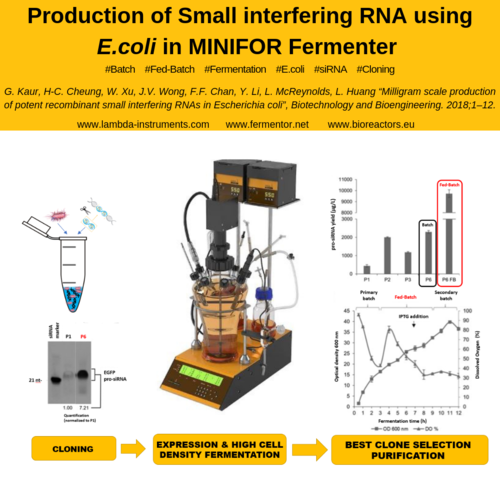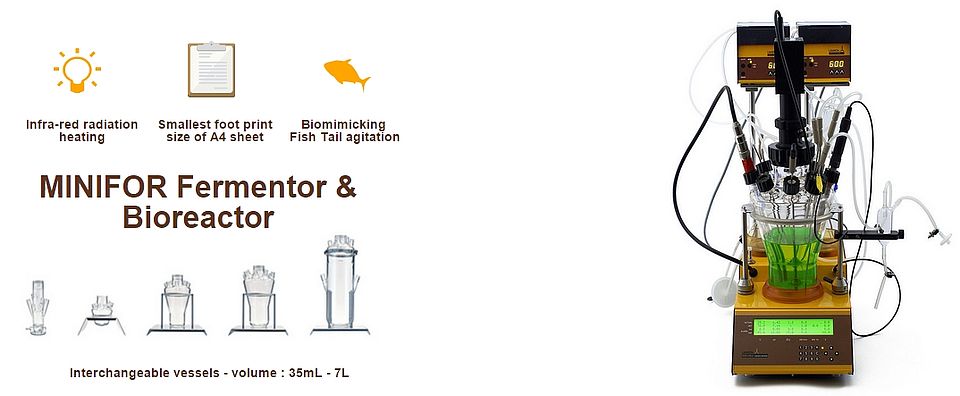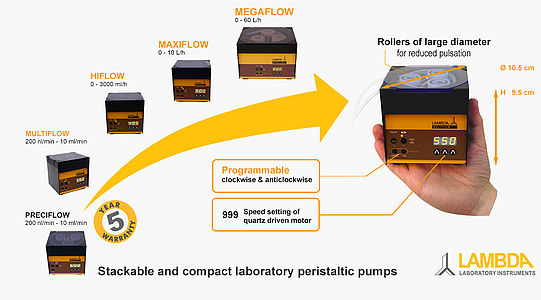
Reference: G. Kaur, H‐C. Cheung, W. Xu, J.V. Wong, F.F. Chan, Y. Li, L. McReynolds, L. Huang “Milligram scale production of potent recombinant small interfering RNAs in Escherichia coli”, Biotechnology and Bioengineering. 2018;1–12. doi.org/10.1002/bit.26740.https://doi.org/10.1002/bit.26740
Small interfering RNAs are used in gene silencing to study the gene functions, treatment of cancer and other diseases. To produce a recombinant small interfering RNAs in Escherichia coli, a research was carried out in the City University of Hong Kong. The researchers achieved milligram scale production of pro‐siRNA in LAMBDA MINIFOR fermenter and a yield improvement by over 200‐fold compared with the traditional shake flask culture method.
High-cell density fed-batch fermentation of E. coli in LAMBDA MINIFOR fermenter
Different recombinant siRNA clones of E.coli were cultivated in the LAMBDA MINIFOR fermenter to study siRNA production efficiency. High cell density fermentation was performed in batch cultivation followed by fed-batch fermentation. Results obtained in fed‐batch process showed that optical density (OD) of an average culture at 600 nm were 39.8 and 41.7 g/L biomass (wet cell weight). With a high–cell density fed‐batch fermentation method in the LAMBDA MINIFOR fermenter, the optimised clone produced a yield of ~10 mg purified pro‐siRNA/litre of bacterial culture.
Innovations help to select the best strain in shortest time!
Selection of best clones that are producing your product of interest is a time-consuming process, especially if the optimisation and selection performed in a fermenter. Cleaning, preparation, setting up a fermenter for autoclave before a run is a difficult job with traditional fermenters. These problems are eliminated in the LAMBDA MINIFOR fermenter system by introducing many revolutionary changes:
- Elimination of complex head plates
- Optimised vessel design
- Unique easy sterility construction
- Novel non rotational mixing
- Exceptional volume range in one single instrument etc.

LAMBDA MINIFOR is advantageous to work with aerobic and micro-aerophilic or anaerobic bacterial (e.g.: E. coli, B. subtilis, B. anthracis, B. amyloliquefaciens, B. pumilus, B. licheniformis, S. aureus, etc.) and yeast (e.g.: S. cerevisiae, P. pastoris, S. pastorianus, S. uvarum, etc.) cultures (co-culture) under batch, fed-batch or continuous (chemostat) mode of operation.
Parameter control: temperature, agitation, pO2 (OD), pH, air flow rate by internal thermal MASSFLOW gas flow control (controlled supply of air for aerobic or N2 for anaerobic process)
Variable speed peristaltic pumps for continuous and fed-batch fermentation
The high quality LAMBDA peristaltic pumps have been specially developed for long term continuous processes like fermentations and cell cultures.

LAMBDA's unique tubing compressing mechanics reduces pulsation and is very gentle to the tubing. No clamps, fixings or stoppers are required to hold the tubing in place. This leads to a long tubing life and the long term stability of flow rates even with low cost tubing.
- Highly reliable pumps with reproducible flow rates for bioprocessing techniques
- Unique tubing compression technique for long tubing life and long term stability of flow rates even with low cost tubing
- Flow rates remain constant for several weeks without the risk of tubing rupture in long term experiments like continuous cultures, chemostat, perfusion
- Variable speed pump for better precision e.g.: speed of the peristaltic pump is regulated to attain the preset value of pH, during the addition of acid/base to the medium
- Can also be used as a stand-alone instruments for other lab experiments.
Features of LAMBDA MINIFOR bench-top fermenter could be found at www.fermentador-bioreactor.com/features/ and www.lambda-instruments.com/fermenter-bioreactor/
Keywords: E.coli, fermentation, batch, fed-batch, high cell density fermentation, small interfering RNA production, fermenter.